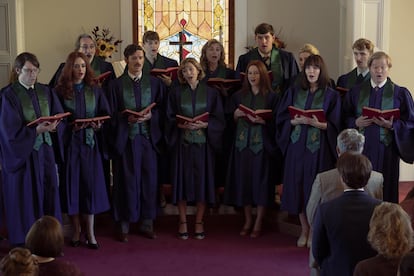She killed her lover’s wife with 41 axe blows and was acquitted: Candy Montgomery’s story returns to television
The miniseries series ‘Love and Death’ – produced by Nicole Kidman and starring Elizabeth Olsen – recreates one of the most high-profile events in American criminal history. The tragedy occurred in the tedium of a small Texas town over four decades ago


The facts: at ten o’clock in the morning, on Friday, June 13, 1980, in the city of Wylie, Texas,
Candy Montgomery – a 30-year-old housewife, who attends daily mass and is very involved in community activities – goes over to the home of her neighbor and friend, Betty Gore. In theory, she wants to ask if it’s okay for Betty’s elder daughter to go to the movies that afternoon with her family and spend the night.
In the space of time from when the visitor closed the door to when she opened it to leave, only Montgomery knows for sure what happened.
Betty Gore’s corpse was left lying on the ground, covered in marks after having received 41 axe blows. She was discovered by some neighbors, who also found the deceased’s one-year-old baby crying inconsolably in her cradle.
Candy Montgomery, her family and Gore’s other daughter, meanwhile, carried on with the evening. They had gone to see Star Wars: The Empire Strikes Back.
The verdict: not guilty. The subsequent investigation revealed that Candy Montgomery – who admitted to killing her neighbor and showering at the crime scene to clean the blood off – previously had an affair lasting just under one year with the victim’s widower, Allan Gore, who was out of town on a work trip on the day of the murder.
According to the versions of both Candy and Allan, the affair had ended months before. But, according to Montgomery, Betty Gore knew about the affair and was still bothered. Supposedly, this is why, during Candy’s visit, she suddenly brought an axe into the room, in order to threaten her guest and demand that she not get any closer to her husband.
The defendant alleged that the act of taking the tool away from Gore and using it against her was in self-defense. This statement passed the polygraph test with flying colors and the jury gave it credibility, much to the uproar of the public. For many, 41 axe blows seemed too vehement of a defense.
Shortly after the trial, Montgomery divorced her husband – who discovered the affair during the investigation – reclaimed her maiden name and started a new life in another city as a mental health therapist.
This is one of the favorite crime stories for fans of the subgenre in the United States. After sparking controversy in the Texas community, the case rose to national interest, thanks to the book Evidence of love: A true story of passion and death in the suburbs. This investigation by journalists John Bloom and Jim Atkinson instantly became a best-seller in 1984.
In addition to countless documentaries and special episodes in subsequent murder shows, the book was adapted into the Hulu series Candy (2022), with Jessica Biel in the leading role. Less than a year later, it will have a new incarnation: HBO Max has announced that, on April 27, it will launch the miniseries Love and Death, starring Elizabeth Olsen as Candy Montgomery and Jesse Plemons playing the husband of the victim.
Despite the fact that the event took place more than 40 years ago, the pull of the story is evident. It contains an unsolved mystery, a forbidden love story, an excitingly bland setting – the typical city and neighborhood where nothing ever happens (until it does) – and a conservative and religious breeding ground that acts as a pressure cooker.
“I’ve done everything a woman is supposed to do: take care of the house, prepare the food... where’s my reward?” Montgomery asks Elizabeth Olsen in the trailer for Love and Death, while we see her character pick up the laundry, serve dinner and recite prayers in the Methodist church she attends. With Nicole Kidman as executive producer, the trailer doesn’t point to substantial differences in approach with respect to Candy, which also favored the defendant’s point of view. However, the signature of screenwriter David E. Kelley – creator of hit shows such as Ally McBeal (1997-2002) and Big Little Lies (2017-2019) – invites us to anticipate a twist on the legal and social dimensions of the plot.
“Candy didn’t mind taking care of the children and the house, but she was mad with boredom. So, on her 29th birthday, it was a ray of light for her to receive a completely unexpected phone call,” Bloom and Atkinson narrated in Evidence of love.
In the text, the men underlined the state of repression under which both Candy and her lover lived when they decided to start seeing each other. When Montgomery initially approached him with the proposal, he rejected it and, weeks later, declined over the phone. The writers also dedicated a few lines to the hypnosis session to which the defendant was subjected, in order for her lawyer to find a way to justify those 41 axe blows. During the session, a childhood trauma emerged, related to Candy Montgomery’s mother telling her to be quiet. In the struggle for the axe with Betty Gore – during the reconstruction of the events provided by the hypnotized woman – it was thought that a “Ssssh!” snapped by the neighbor may have triggered the cruelty.
“I keep saying that it was a crime of passion. Wouldn’t you like to love someone on that level? And have it so that this person loved you too?” one spectator of the trial asks another at the climax of Candy.
The conversation – while fictional – is an explicit irony about the role of viewers of the true crime genre and their addiction to gruesome stories. There’s a degree of morbidity, but also identification with certain aspects of certain stories, no matter how repugnant they may be. Proof of this is that Candy was the most-watched series on all streaming services during its premiere week in the United States, as measured by Justwatch… despite the fact that Hulu is estimated to have nearly 30 million fewer subscribers than Netflix.

“I think it’s a bit of the Jungian concept of the shadow [the archetype with which the Swiss psychiatrist Carl Gustav Jung defined the dark side of personality]. The world we have now pretty much denies the shadow, the bad, the anger and everything dark. But the fact that we deny it and pretend on Instagram that we’re super happy doesn’t mean that this side doesn’t exist,” reflects Mona León Siminiani, a critic of the true crime genre in Spain, who hosts the podcast Do you speak fear?
Siminiani thinks that true crime has reached a new golden age, thanks to the rapid rise and consolidation of podcasting – not only because of the modern structure established to “accompany the people who, in real-time, start to investigate with their little notebook and their tape recorder,” but because “everything that is now heard is a billion times more suggestive and terrifying.” She also believes that the success of this genre is related to the contemporary obsession with image… “to look good and not be taken for crazy.”
“Soccer sometimes conveys anger… as bullfighting could do before, which is literally killing. These impulses have to come from somewhere. The bloodthirsty and sadistic stories of true crime are a break from all the [fake positivity] that we’re immersed in… we’re more slaves of this [positivity] than we think.”
“One thing is the event itself and another thing is the story. What we consume is the story – what does the crime entail, what’s the main theme, where does it leave us, who are we in relation to it. They’re like fairy tales for adults, with the same warnings: don’t talk to strangers, beware of the boogeyman or the wolves in sheep’s clothing… [be wary] of those friendly neighbors who always say hello and who may happen to have people buried in the backyard.”
“It’s one thing to be killed,” she notes “but that they subject you to this brutality, or that they do that to someone you love or know… there’s nothing romantic or pretty about a murderer.”

The actual parties can attest to this. The woman formerly known as Candy Montgomery – who isn’t legally a criminal, nor has she been seen involved in any similar event since 1980 – is now 73 years old. Her personal Facebook account – with the name she currently uses – has been inactive since 2021. It’s easy to understand why: the posts she has made – most of which are related to her professional activity – are littered with comments insulting her and recalling the event. The score as a therapist that she receives via online ratings isn’t good… and it’s unclear whether the reviews come from actual patients, or from cyberbullies who have tracked her down.
Montgomery left the town of Wylie after the 1980 trial because her neighbors were yelling “Murderer!” at her, but also because of the scrutiny her personal life was subjected to. For the bulk of Texan society at the time, adultery was an equally appalling crime. In fact, during the trial, it was deemed appropriate to bring up another previous infidelity by the housewife.
The family of the deceased doesn’t want to know anything about the death being dredged up. This is possibly due to the fact that, in the different productions, Candy Montgomery is given various motivations and justifications, while Betty Gore is simply portrayed as a deranged woman – bitter, repressed and obsessed with making her husband like her.
In an article, Buzzfeed journalist Stephanie McNeal quotes an anonymous source from the Gores, who is saddened by the renewed interest in the case and is “not able to comment’' on the portrayal of their family in the two series. This individual claimed to have never been contacted by anyone from the productions.
“It’s extremely frustrating and definitely stressful,” the member of the Gore family says. “I hate that when I just want to kick back and scroll through the Hulu menu, I have to see a giant picture of Candy.”
Sign up for our weekly newsletter to get more English-language news coverage from EL PAÍS USA Edition
Tu suscripción se está usando en otro dispositivo
¿Quieres añadir otro usuario a tu suscripción?
Si continúas leyendo en este dispositivo, no se podrá leer en el otro.
FlechaTu suscripción se está usando en otro dispositivo y solo puedes acceder a EL PAÍS desde un dispositivo a la vez.
Si quieres compartir tu cuenta, cambia tu suscripción a la modalidad Premium, así podrás añadir otro usuario. Cada uno accederá con su propia cuenta de email, lo que os permitirá personalizar vuestra experiencia en EL PAÍS.
¿Tienes una suscripción de empresa? Accede aquí para contratar más cuentas.
En el caso de no saber quién está usando tu cuenta, te recomendamos cambiar tu contraseña aquí.
Si decides continuar compartiendo tu cuenta, este mensaje se mostrará en tu dispositivo y en el de la otra persona que está usando tu cuenta de forma indefinida, afectando a tu experiencia de lectura. Puedes consultar aquí los términos y condiciones de la suscripción digital.








































